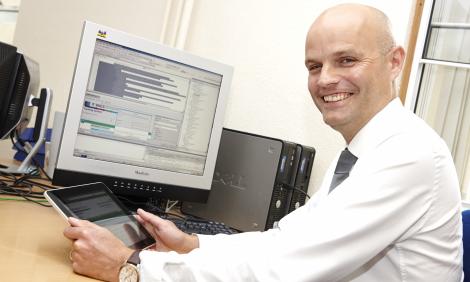Clinical bioinformatics (health informatics)
Bioinformatics (health informatics) combines computing science with information science, biology and medicine.
Overview
You’ll provide support to ensure that bioinformatics data is used efficiently and to required standards. Connecting computing science, information science, biology and medicine is one of the fastest growing areas of research and development within healthcare.
Vast amounts of data and information are generated and bioinformatics resources are used. The NHS is using advances in this area in diagnostic testing and management to provide the highest quality patient care and outcomes.
You’ll need a good grounding in, information analysis and computing, as well as clinical, biomedical or physical sciences. This unique combination will enable you to integrate into a clinical-health informatics environment.
Working life
You will work as a clinical scientist, as part of a multidisciplinary team that includes clinical scientists, doctors, specialist nurses, informatics specialists such as clinical informaticians, information management and technology teams and external providers of software including databases.
In your work, you’ll:
- provide cross sub-discipline bioinformatics support
- ensure data received and generated is interpreted and used in an efficient, standardised, secure and accurate manner
- use leading edge technologies
- adhere to information governance standards.
You'll be provided with the opportunity to further develop specialist informatics skills such as information governance, interpretation, analysis and use of information. You’ll also have the opportunity to gain greater knowledge of systems development and design.
You’ll further develop strategic working and leadership skills and will be expected to advise on best practice in a variety of areas, including:
- interpretation, integration and reporting of a range of data, intelligence and evidence from large datasets or 'Big Data' that an organisation/system produces
- explaining the significance of data in a way that can be easily understood by others (patients, clinicians and managers)
- data mining, handling and processing
- advising peers and colleagues on best practice in:
- data and information security
- patient confidentiality
- record sharing
- information sharing with patients/clients
- records access by patients
- reviewing opportunities for the application of tele-health or tele-medicine
You’ll develop the skills and tools needed by all professionals in a modern healthcare system. You'll also provide services that are safe, secure, high quality and have patient at the centre.
Want to learn more?
-
Most jobs in the NHS are covered by the Agenda for Change (AfC) pay scales. This pay system covers all staff except doctors, dentists and the most senior managers. Trainee clinical scientists train at band 6 level, and qualified clinical scientists are generally appointed at band 7. With experience and further qualifications, you could apply for posts up to band 9.
Staff will usually work a standard 37.5 hours per week. They may work a shift pattern. Terms and conditions of service can vary for employers outside the NHS.
-
With further training and/or experience, you may be able to develop your career further and apply for vacancies in areas such as further specialisation, management, research, or teaching.
-
Labour market
In November 2018, there were 6,123 clinical scientists registered with the Health and Care Professions Council.
The NHS Scientist Training Programme attracts many more applicants than there are places and so there is considerable competition for places.
Finding and applying for jobs
When looking for a job or training place, check vacancies carefully to be sure you can meet the requirements of the person specification before applying and to find out what the application process is. You may need to apply online or send a C.V. for example.
For the NHS Scientist Training Programme (STP) there is an annual recruitment cycle. Applications usually open in early January for the intake in the following autumn.
Applications for the STP should be made through the National School of Healthcare Science's website, where you can also find information about the programme and the recruitment process.
Key sources relevant to vacancies in the health sector:
- Vacancies in organisations delivering NHS healthcare can be found on the NHS Jobs website
- Vacancies in local government can be found on the Local Government Jobs website and the Jobs Go Public website
As well as these sources, you may find suitable vacancies in the health sector by contacting local employers directly.
Find out more about applications and interviews.
Volunteering is an excellent way of gaining experience (especially if you don’t have enough for a specific paid job you’re interested in) and also seeing whether you’re suited to a particular type of work. It’s also a great way to boost your confidence and you can give something back to the community.
-
For further information about working and training in bioinformatics (health informatics), please contact:





